Grade Potential Tutoring is an established US-based tutoring company that offers one-on-one, in-home and online tutoring. Founded in 2002, it claims thousands of happy students nationwide. This article reviews Grade Potential’s reputation and services, including user feedback, pricing details, alternatives (like My Engineering Buddy), and other company info for 2025. We compare pros and cons, and include FAQs. All statements are backed by current sources for accuracy.
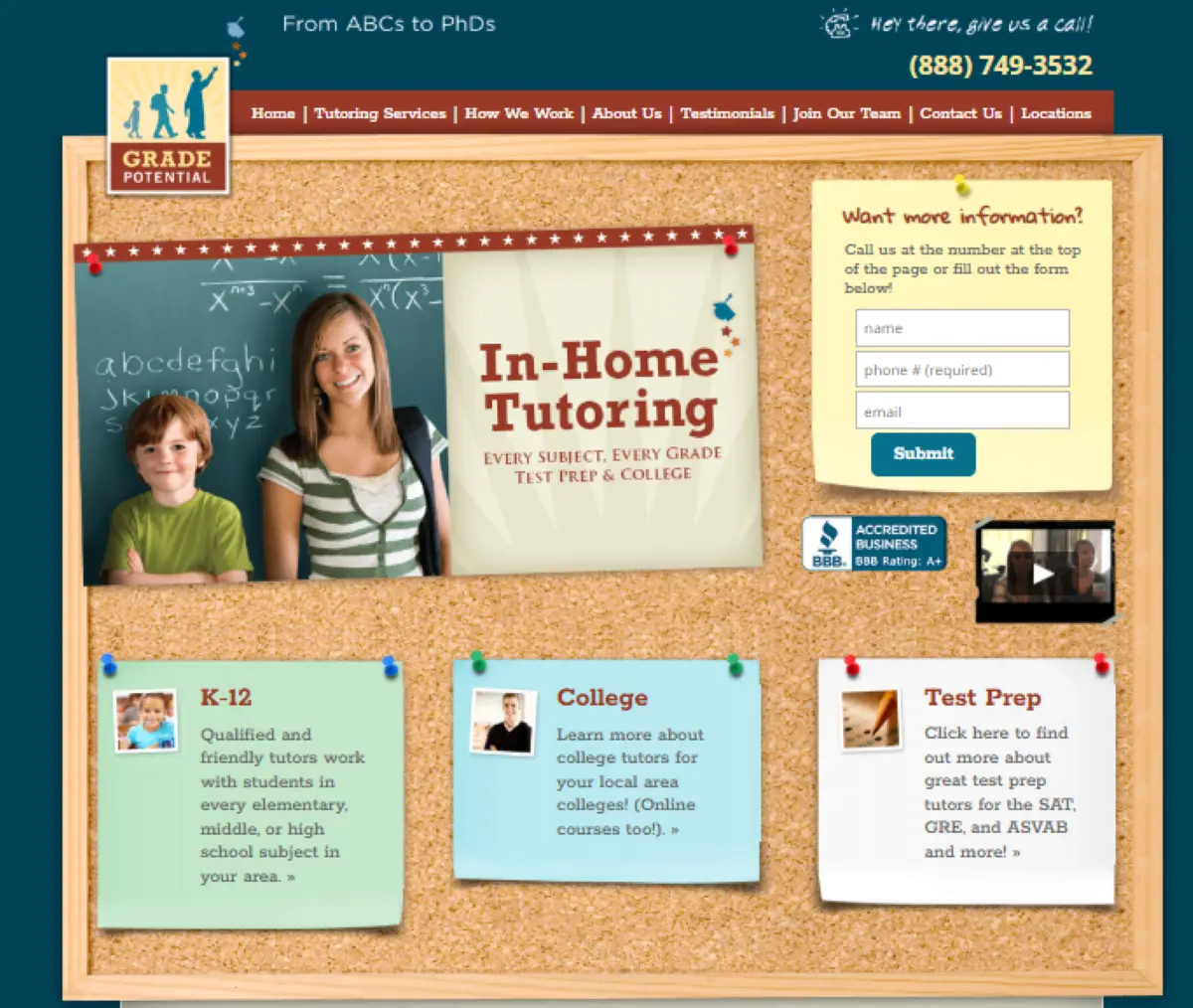
Grade Potential Tutoring Reviews and Testimonials
We examined customer reviews on the company’s own site, BBB, and education forums. On its website, Grade Potential features glowing testimonials. For example, one parent wrote: “You returned our call right away… She will now be able to attend the college of her dreams this fall… a great experience!”. Another family praised how the tutor “turned the mountain into a molehill” of makeup work, leading their daughter to finish the year with a 3.8 GPA. These site testimonials show parents crediting Grade Potential tutors for clear explanations and real grade improvements.
By contrast, independent reviews are mixed. On the Better Business Bureau (BBB) page, several 5-star reviewers rave about friendly, knowledgeable tutors and fast results. For instance, one parent praised the tutor’s patience and how their child’s understanding improved dramatically. These positive comments note improved grades and confidence after working with Grade Potential.
However, some reviews raise red flags. Several BBB complaint listings (1-star) mention service and policy issues. For example, one parent said a Grade Potential tutor cancelled unexpectedly and it was hard to get a refund. Others reported being charged up-front fees (like a $48 background check) but later struggling to cancel or recover that money. These customer comments suggest that some families encountered rigid policies or communication problems.
Third-party analysis of reviews confirms this mix. One recent industry write-up notes Grade Potential has an A+ rating from BBB, reflecting longevity, but also notes “mixed reviews are common” in tutoring. We also saw discussion threads where former tutors describe high family fees (up to $70/hr) vs. low tutor pay, and some reporting cancelled assignments. On balance, external feedback suggests Grade Potential is legitimate (in business since 2002) with skilled tutors, but families should be aware of reported administrative hiccups and costs.
- Positive feedback: Parents praise skilled tutors, one-on-one attention, and improved grades.
- Negative feedback: Some report scheduling or cancellation problems, high cost, and slow refunds.
- Legitimacy: Grade Potential is BBB-accredited (A+ since 2006) and operates nationwide since 2002. Overall, it is a real company, though experiences vary by customer.
Grade Potential Tutoring Pricing
Pricing Range
Grade Potential does not publish prices on its website. Based on industry reports, it charges by the hour. Third-party research estimates that tutoring sessions typically run $45–$80 per hour, with most families paying around $60–$70/hr. Rates vary by subject difficulty and tutor qualifications. In practice, advanced subjects or very experienced tutors tend to cost more. For example, one reported figure notes families being charged up to $70/hr. The company does offer package discounts: longer tutoring plans usually have a lower per-hour cost.
If you want an exact quote, Grade Potential suggests contacting them directly (by phone or form). There is no public “pricing page,” so families must call or email for custom pricing. (Some tutors share that tutoring pay in contracts is often $20–$35/hr, indicating markups on the family fee.)
What Students Say About Pricing
On forums and social media, pricing is a common topic. Some students and parents feel the service is pricey. A former Grade Potential tutor wrote that clients were sometimes charged about $70 for an hour, while the tutor got around $13–$25 of that. Others on Reddit and review sites said the cost seemed high compared to other online options. However, some families defend the cost if their child makes quick gains. In a user analysis, it was noted that “some parents feel the investment was worthwhile given the results,” while others question value versus cheaper alternatives. In short, students say Grade Potential is on the expensive side, though discounts for buying packages or first-session deals do exist (see next sections).
Hidden Costs
Be aware of possible extra charges. Some reviews mention one-time fees, like the $48 background check charged to new tutors (which ultimately may be passed to clients in pricing). Also, if you pre-pay or buy packages, check whether any portion is refundable. We found no clear cancellation or refund fees disclosed on the site. However, several complaints suggest trouble getting refunds for unused sessions. It’s wise to ask the company explicitly about any enrollment fees, deposit, or late-cancellation policy before signing up.
How Pricing Works
Grade Potential operates on a pay-per-session model. There are no published monthly subscription plans, just hourly tutoring sessions. Families typically pay via credit card or check. According to BBB, they accept checks and all major cards (Visa, MasterCard, AmEx, etc.). Payment is handled up front for booked sessions or packages.
Discounts and promo codes are not heavily advertised by Grade Potential. (One coupon site found a “50% off first hour” deal, indicating occasional promotions.) The company does offer package pricing: buying multiple sessions upfront can lower the hourly rate. In practice, students report smaller “trial” sessions or first-hour deals if arranged with Grade Potential or via affiliate sites. It’s reasonable to ask about first-session discounts when contacting them.
- Payment: By credit/debit card or check.
- Packages: Discounts available for multi-session packages.
- Discounts: Some sources list a 50% off first-hour offer.
Free Trial
Yes, Grade Potential offers a form of free trial. BBB notes that “new clients can get a risk-free trial session”. This typically means the first short session is offered at no charge or satisfaction-guaranteed. Similarly, fullmindlearning.com reports that the process starts with a free consultation to assess the student’s needs. So parents can expect an initial no-obligation call or session before committing to full tutoring. If this is important to you, confirm with Grade Potential that you won’t be charged for the first meeting.
Refund Policy
The official refund policy is not publicly detailed. It appears that all payments are final once services are scheduled. Reviewers, however, report mixed experiences. One parent complained they requested a refund and were promised a mailed check, but weeks later hadn’t received anything. Another review described being billed and then facing difficulty canceling. On balance, families should assume refunds are difficult and should clarify cancellation terms. We recommend asking Grade Potential about their refund/cancellation policy upfront and keeping track of any agreements in writing.
Grade Potential Tutoring Alternatives
Some families look beyond Grade Potential for tutoring. There are many alternatives, each with its own focus. Below are a few well-known options (including My Engineering Buddy), with pros and cons versus Grade Potential.
My Engineering Buddy
My Engineering Buddy (MEB) is an online tutoring platform focused on higher-level math, engineering, and STEM subjects. Unlike Grade Potential’s broad K-12 focus, MEB is tailored to college and advanced coursework. It serves over 10,000 students with many engineering degrees on staff. Its advertised rate is lower: average tutoring is about $20–$35 per hour(often around $25/hr, compared to Grade Potential’s ~$60/hr). An MEB review boast says “quality of tutoring and homework help is way above the rest”. It also promises very fast tutor matching (often within a few hours) and even a $1 trial session.
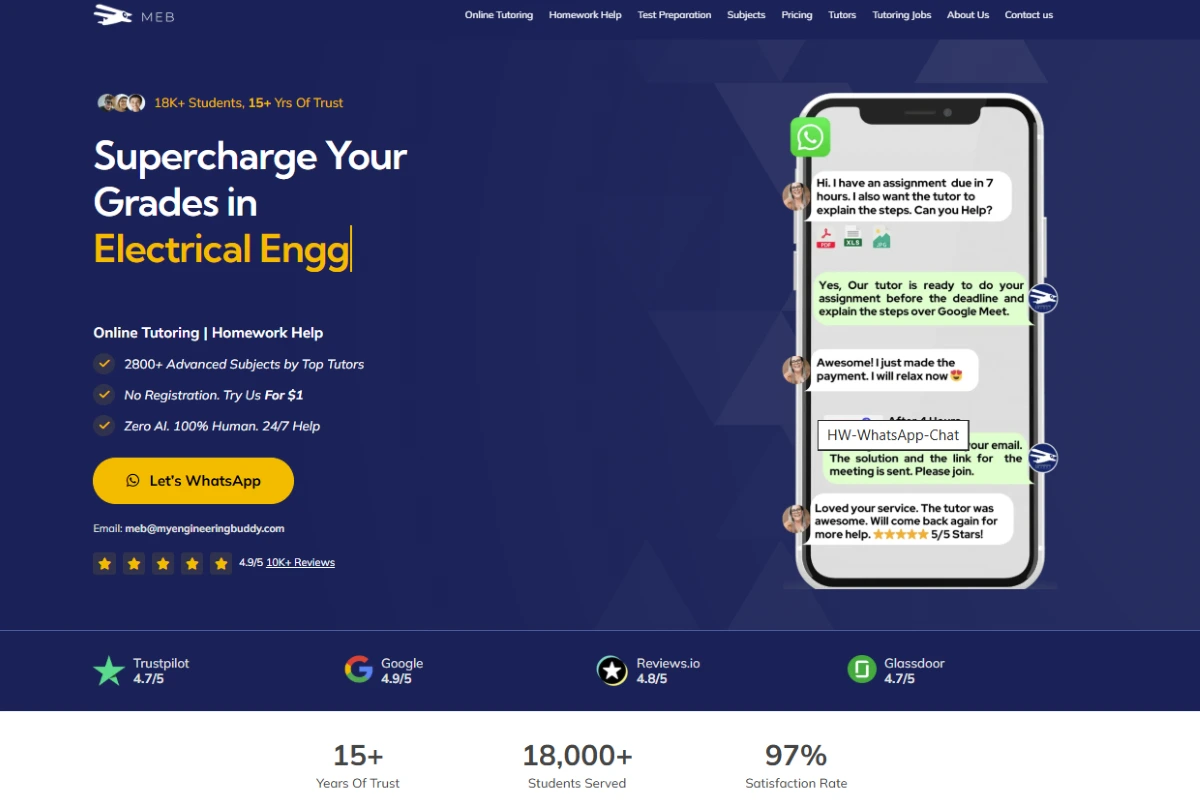
Pros vs. Grade Potential: MEB is strong for college/engineering homework and exam prep, offering specialized help in subjects like calculus, circuits, and software (ANSYS, AutoCAD, etc.). Its prices are lower, and user feedback highlights its fast customer service and high grades attained. Cons: It’s niche, not offering help for elementary or general subjects like English or history. It’s also all online (no in-home visits) and geared to self-motivated students. In summary, My Engineering Buddy is often a better fit for advanced STEM subjects and cost-conscious students, whereas Grade Potential is broader and offers in-person tutoring.
Chegg Study
Chegg Study is a popular homework-help service (with a monthly subscription around $15). While it no longer offers live tutoring in the US, Chegg provides step-by-step solutions and expert Q&A for many subjects. Chegg’s advantage is its affordability and 24/7 access to answers. At roughly $30/hr equivalent (by some estimates), it’s cheaper than Grade Potential. However, it is not one-on-one tutoring; there are no scheduled sessions. Instead, students post questions and get written answers. Chegg is best for quick homework help or textbook solutions. Unlike Grade Potential, it won’t schedule a personal tutor or provide interactive lessons. It’s more of a supplement than a tutoring program.
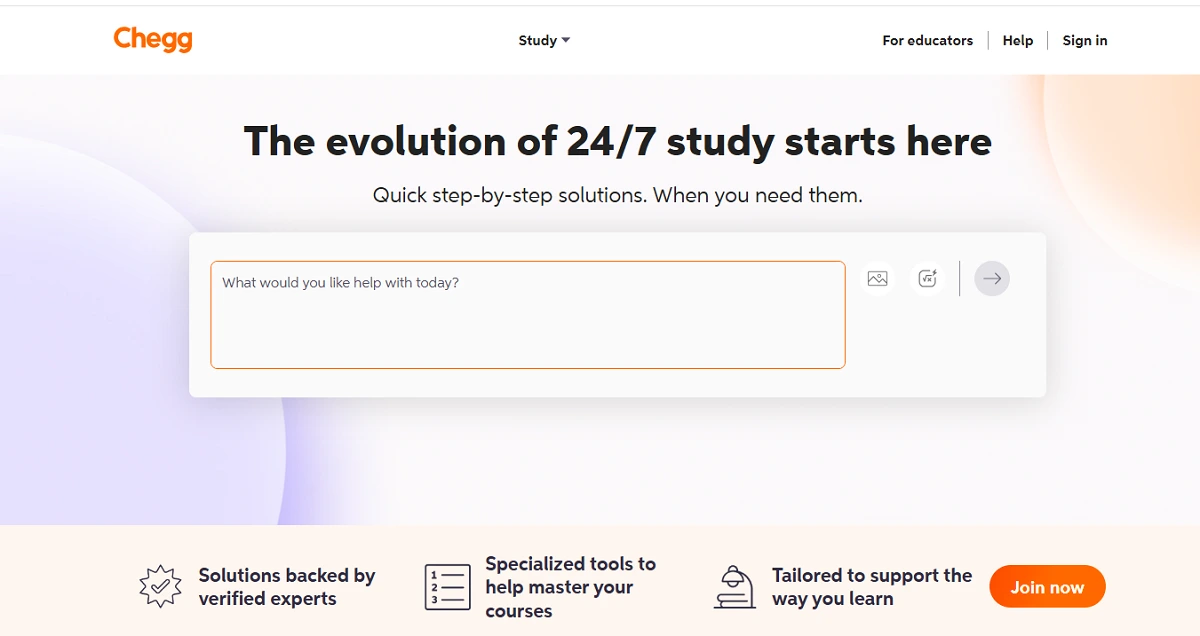
Pros vs. Grade Potential: Chegg is much cheaper, offers instant help at any hour, and has a vast study library. Cons: No live tutor, so less personalized learning. It doesn’t work as well for long-term tutoring needs or in-depth teaching. If you only need occasional question answers, Chegg is useful. But for guided learning and accountability, Grade Potential’s human tutors are stronger.
Varsity Tutors
Varsity Tutors is a nationwide tutoring service offering both online and in-person sessions in hundreds of subjects. It is larger and more costly than Grade Potential. Pricing is premium around $70–$95 per hour for standard packages. They do often have many tutors per subject and a polished online classroom, plus additional features like group classes and test prep courses.
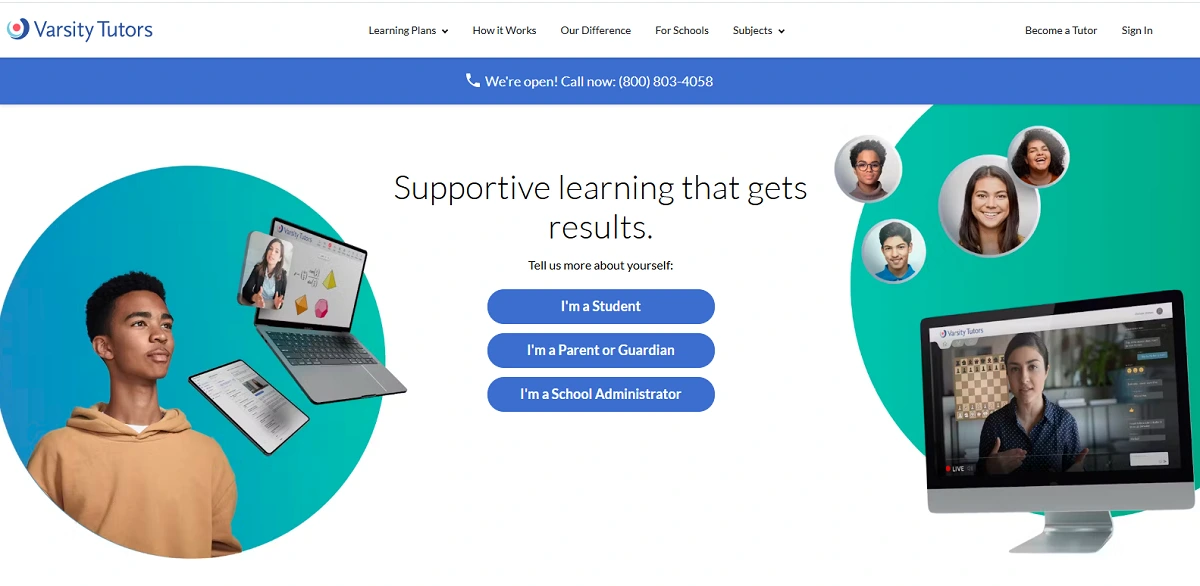
Pros vs. Grade Potential: Varsity Tutors has a wide global reach and can provide tutors nearly 24/7. They offer high-quality, screened tutors (often current teachers or PhDs) and advanced features (recorded sessions, etc.). Cons: Very expensive (higher than Grade Potential). Also, some users say the pace can feel fast to justify the cost, and as with any marketplace, match quality can vary. Varsity’s focus is similar (K-12 through college), so think of it as a premium alternative with higher rates.
Wyzant
Wyzant is an online platform where tutors post their rates and students choose them directly. It covers all subjects. Hourly rates vary widely, roughly $50–$75 per hour on average. The platform allows face-to-face (online) or local in-person tutoring. One difference: Grade Potential provides a full service (matching and scheduling) while Wyzant puts the match-finding on the student. You can find a cheaper or cheaper tutor on Wyzant if you shop around. The downside is that tutor quality can be hit or miss, and there is no customer support shaping the match.
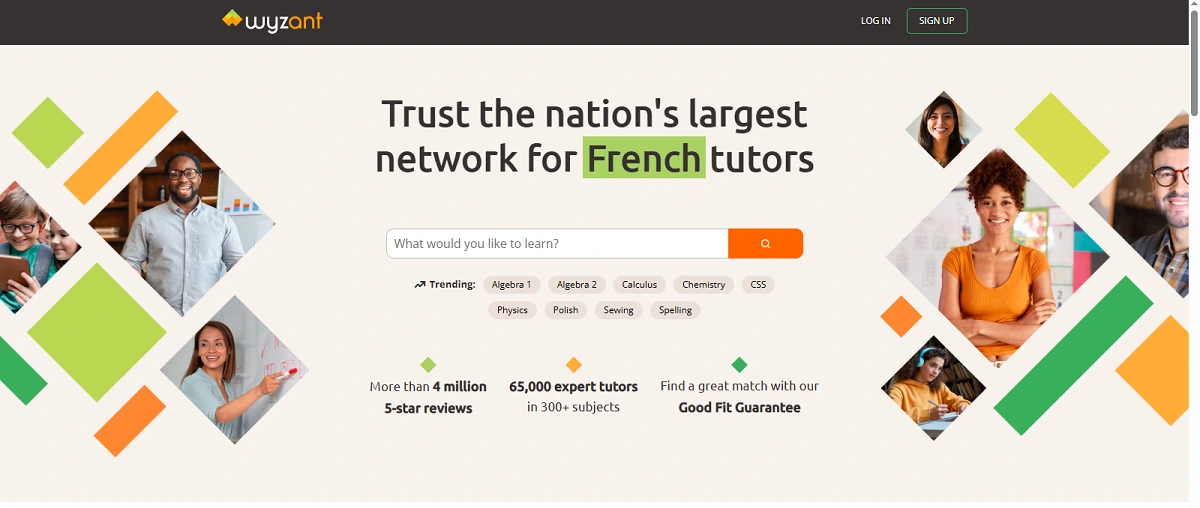
Pros vs. Grade Potential: On Wyzant you may find lower prices and greater flexibility in picking a tutor yourself. There is no contract; you pay per lesson with no package needed. Cons: No guarantee of quality, and you must vet tutors on your own. Grade Potential’s value is in handling tutor selection and having a consistent service protocol.
- Other Alternatives: There are many niche and free options. For example, Khan Academy offers free video lessons (great for basics but no personal tutor), and homework Q&A sites like Course Hero or Brainly provide answers, though again not live tutoring. Each choice has trade-offs in price, subject focus, and service model.
How It Works?
For Students
Joining Grade Potential is a multi-step process designed to match students with the right tutor. It generally follows these steps:
- Sign up / Consultation: You contact Grade Potential (via phone or online form) and discuss your student’s needs. They start with a free consultation to assess goals and challenges.
- Tutor Matching: Based on this, Grade Potential assigns a tutor who is specialized in the needed subject and matches the student’s learning style. They handle background checks for tutors.
- Plan & Schedule: The tutor and family create a personalized learning plan. Sessions are scheduled at times and locations convenient to you (in your home, public place, or online). You can set recurring sessions or as-needed slots.
- Tutoring Sessions: Tutoring begins per the schedule. Sessions are one-on-one, typically an hour long. Tutors help with homework, tests, concepts, etc., focusing on the student’s goals.
- Progress Tracking: After each session, tutors often report on progress. Grade Potential may adjust the plan if needed, and families can provide feedback to ensure satisfaction.
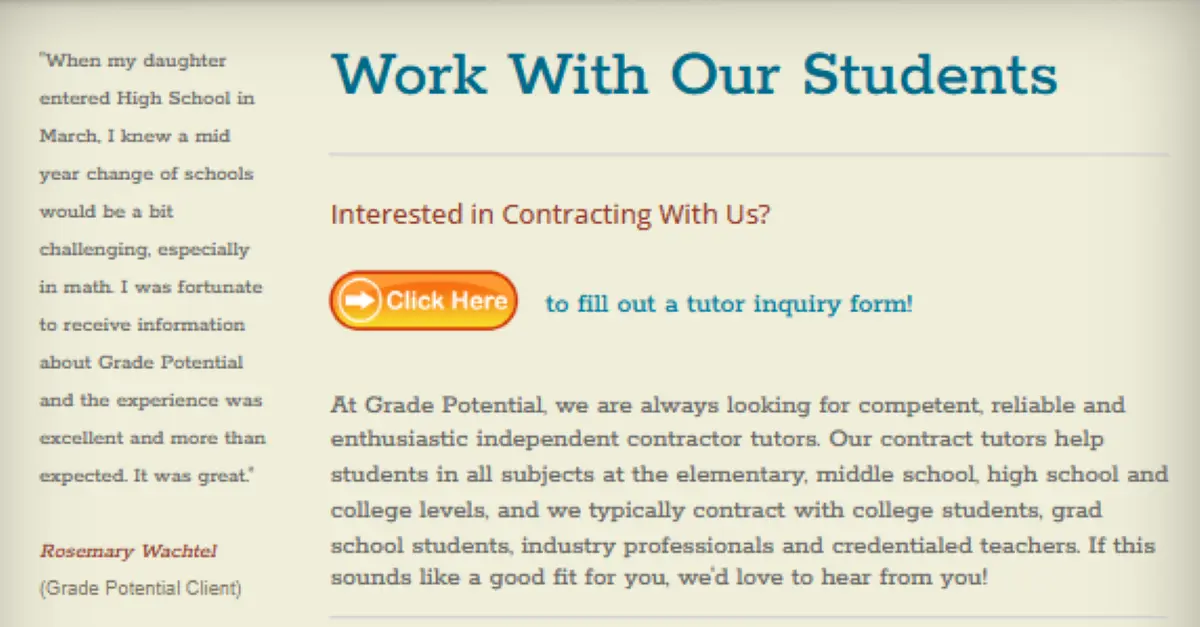
Throughout, Grade Potential’s staff facilitate everything. They coordinate scheduling and billing, so parents mainly just communicate subject goals and then meet the tutor. Many reviews mention this convenience as a plus. In our review of their model, we note the focus on individualized instruction and flexible scheduling to fit busy families.
For Tutors
Tutors work as independent contractors for Grade Potential. To become a tutor, one must apply online and meet certain criteria. Grade Potential typically hires college students, graduate students, teachers, or professionals with subject expertise. Applicants should have strong knowledge in their subjects and good communication skills.
The process for a tutor is roughly:
- Application: Potential tutors fill out an online application (via the “Join Our Team” page or the job portal) selecting subjects they can teach.
- Vetting: The company will verify qualifications and perform a background check. Tutors are told they will be paid only if hired.
- Acceptance: Once accepted, tutors set their availability in a tutor portal and wait for assignments. Grade Potential handles finding clients for them. Tutors do not find their own clients.
- Tutoring: When matched, the tutor meets the student (in-home or online) at scheduled times and helps with their assignments. They log hours and submit billing through the portal.
- Pay: Grade Potential generally pays tutors between about $20 and $30 per hour, depending on experience and location (some longer-term tutors report earning $30–$40/hr). Payment is typically by check or direct deposit.

Tips and Experience: Tutors praise the flexible schedule (“you can have as many or as few hours as you want”) and having Grade Potential do the client matching. On the other hand, some tutors note that sessions can be irregular, especially at first, so it may take time to build up steady hours. It’s known in tutor forums that Grade Potential provides leads but does not guarantee a fixed workload. Nonetheless, many tutors appreciate the easy sign-up and not having to market themselves; they just focus on teaching.
Grade Potential Tutoring Company Information
Grade Potential Tutoring is a private tutoring agency based in California. Key company details:
- Founded: 2002, originally named “Make the Grade Tutoring”.
- Leadership: Longtime customers may recognize Shannon Sugalski (Head of Customer Experience) as a contact. (Founders’ names are not publicly prominent.)
- Mission / USP: Their slogan is “From ABCs to PhDs,” reflecting coverage of all grade levels. The company emphasizes in-home personalized tutoring in any subject, bringing tutors to your location. This focus on convenience and one-on-one attention is their key selling point. They advertise an A+ BBB rating and certified tutors to reassure families.
- Scale & Services: They operate nationally across the US (with regional offices) and accept students from elementary school through college and even graduate prep. Subjects span K-12 core subjects (math, science, English, history, languages) up through college coursework and test prep (SAT, GRE, etc.). The company claims to have helped over 3,000 students since 2002 (per company info) and thousands more now each year.
- Unique Features: Besides in-home/online tutoring, they highlight the free trial session and personalized study plans. They also maintain constant vetting of tutors (requiring experience or teaching credentials). Tutors are independent contractors who set their own hours but go through Grade Potential’s process.
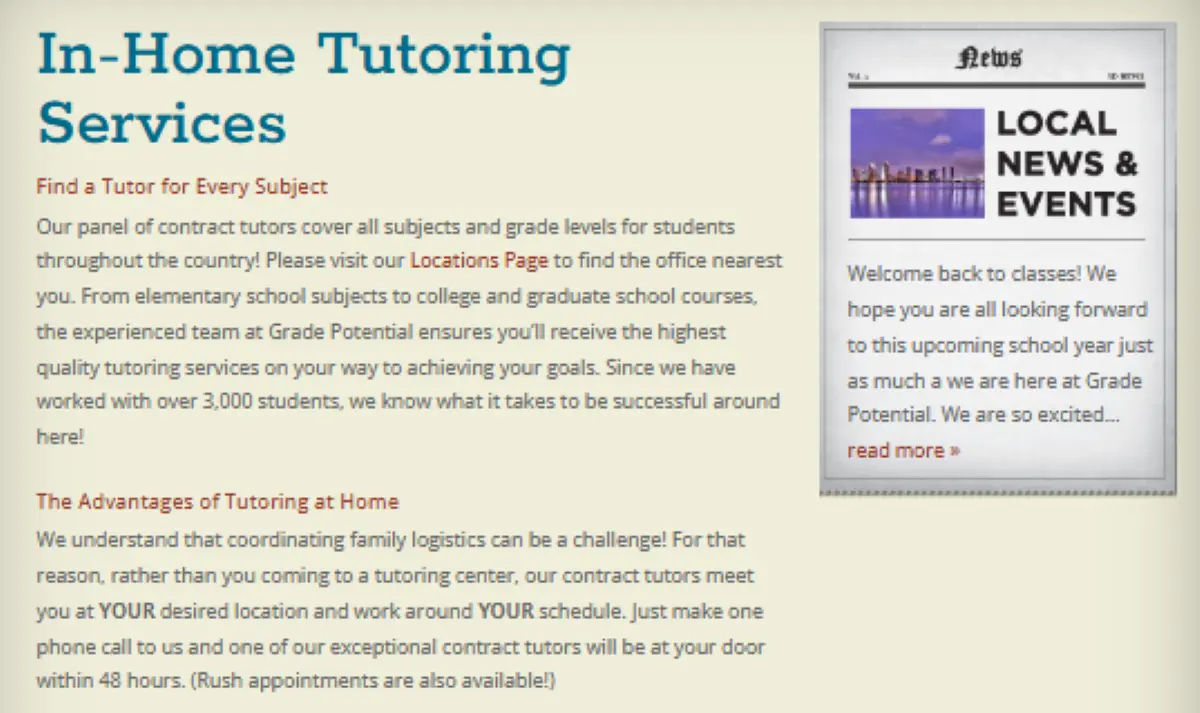
USP of Grade Potential Tutoring
Grade Potential’s unique selling proposition is the combination of in-home convenience and personalized tutoring. Unlike many online-only services, Grade Potential sends a qualified tutor to your home or chosen location. This face-to-face model appeals to families who want hands-on help. Their tutors cover an exceptionally wide range – from elementary math to college test prep – under one umbrella. The company also stresses experience and screening: according to an overview, tutors must pass background checks and have relevant expertise. This mix of safety, personal touch, and broad subject availability is their main USP.
Drawbacks of Grade Potential Tutoring
No service is perfect. Based on reviews and our analysis, Grade Potential’s main drawbacks are its cost and consistency. The pricing is above average for tutoring, which can strain family budgets. Some parents felt sticker shock and wondered if cheaper alternatives might work. Additionally, tutor quality can vary – while many tutors excel, a few families needed to request a different tutor for a better fit. Administrative hiccups have also been reported: scheduling mix-ups, difficulty getting refunds, and delayed customer service responses. In summary, be prepared for higher prices and check carefully how the service works in your area.
Comparison with My Engineering Buddy
Comparing Grade Potential to My Engineering Buddy (MEB) highlights different strengths. Grade Potential covers all grades and in-person help, while MEB focuses on advanced STEM topics online. As noted above, MEB’s average rate (~$25/hr) is much lower than Grade Potential’s typical ~$60/hr. MEB heavily advertises college-level help (engineering projects, design software, complex math). For a college student seeking assistance with homework or projects, MEB’s specialization and lower cost can be a big advantage. But for a high school student needing help in, say, history or literature, Grade Potential would cover that whereas MEB does not. Also, Grade Potential offers face-to-face local tutors, which MEB does not. In short: for general or young-student tutoring needs, Grade Potential is broader; for college/hw help in technical subjects, My Engineering Buddy is often a better fit.
Customer Support and Policies
Grade Potential’s customer support is primarily via phone (toll-free number) and email. They claim to handle all billing and coordination for clients (see “Benefits” in their job posting). The BBB profile confirms they have a designated customer experience manager (Shannon Sugalski). Support hours are typical business hours, and they do not advertise 24/7 support for customers. Response times appear to vary: some customers praise responsive scheduling, others report waiting on hold. Key policies (refunds, cancellations) are not public. According to BBB, their official policy is to consult your representative for details. Based on complaints, it seems callers should press for clear answers. They do accept multiple payment methods (see Payment methods on BBB). Unlike subscription models, they do not auto-bill you; you pay for what you schedule.
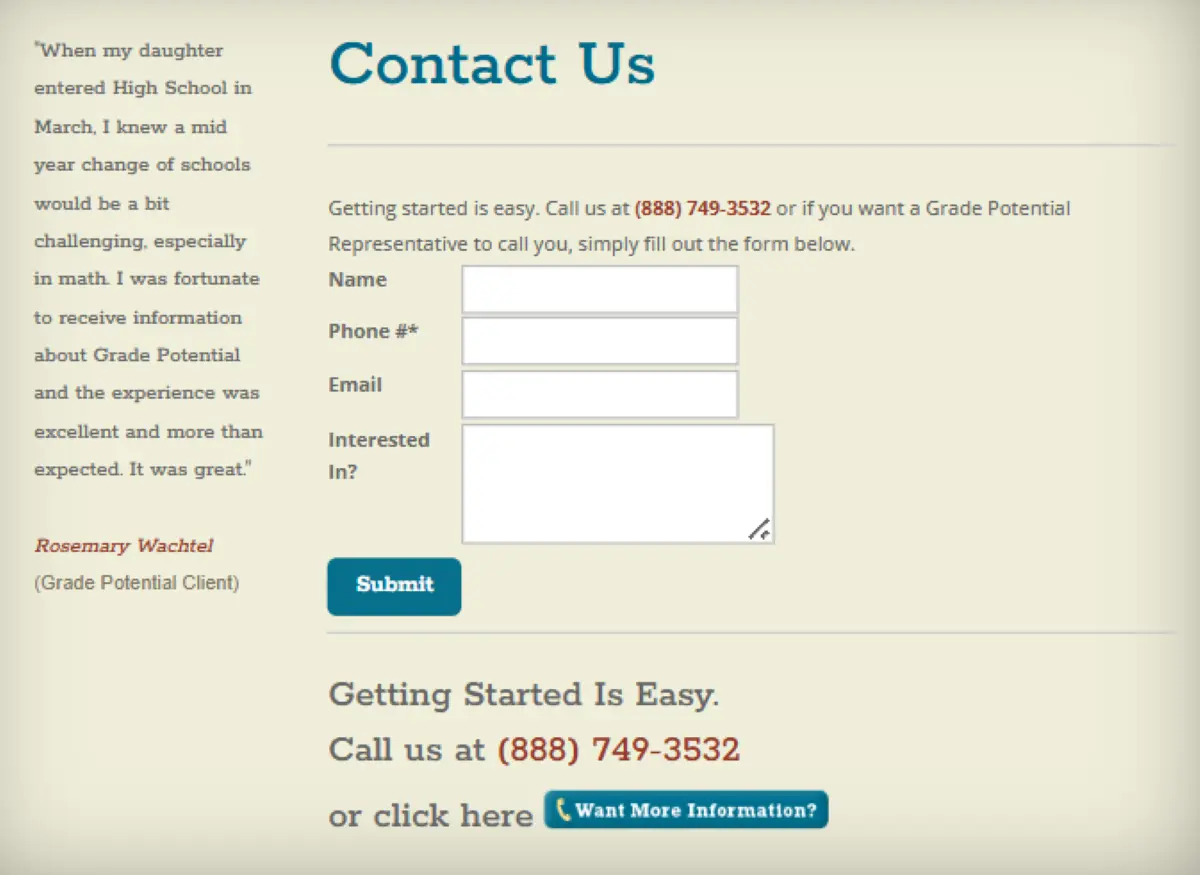
Global Reach and Localization
Grade Potential primarily serves students in the United States. Although they mention “throughout the country” on their site, and have a BBB profile in California, there is no indication they offer services beyond North America. They do not have local branches in Europe, Australia, or Gulf countries. Tutoring is conducted in English. In contrast, some global tutoring companies provide multilingual tutors or country-specific offices, but Grade Potential is geared to English-speaking American markets. (They do have a Tri-Counties BBB affiliation, but no explicit UK/Australia presence.) So, customers from developed countries outside the US may not find Grade Potential accessible unless they need online-only tutoring in English.
Grade Potential’s Future Plans (Including AI)
We found no official announcements of new programs or technology from Grade Potential. However, the tutoring industry is rapidly adopting AI and online tools. As of 2025, many tutoring companies are experimenting with AI-driven homework checks and personalized learning software. Grade Potential has not publicized any AI tutor offerings. It’s possible they may integrate more online platforms or AI assistance in the future, but for now their emphasis remains on human tutors. Customers interested in AI-enhanced learning might consider hybrid services, but grade potential still markets itself as people-focused.
FAQs About Grade Potential Tutoring
Is Grade Potential Tutoring legitimate?
Yes. Grade Potential has been operating since 2002 and is BBB-accredited with an A+ rating. It maintains a professional website, physical offices, and has helped thousands of students. Legitimately, it is a real company (it was originally named “Make the Grade Tutoring”). The mix of positive and negative reviews reflects service quality rather than a scam.
How much does Grade Potential Tutoring cost?
Pricing is not publicly listed. Independent sources estimate about $45–$80 per hour. Most families report roughly $60–$70/hr. Rates vary by subject difficulty and tutor credentials. For exact rates, you must contact them (cost will depend on your subject, grade level, and tutor). Remember that tutors themselves typically earn $20–$35/hr, so clients pay a premium.
Do they offer a free trial or consultation?
Yes. Grade Potential starts with a free consultation to assess needs. BBB also confirms new clients can get a “risk-free trial session”. In practice, this means your first short session or planning call should have no charge (or a satisfaction guarantee). Always verify any trial offer with the company representative.
What if I need to cancel or get a refund?
Cancellation and refund policies are not clearly advertised. Some customers report difficulty cancelling or getting refunds. It’s wise to clarify these policies before committing. Typically, if you pay for a package of sessions, unused sessions may not be refunded. If possible, pay by the session or ask for terms in writing. Given the feedback, expect that refunds could be slow or limited.
How does Grade Potential compare to My Engineering Buddy?
Grade Potential and My Engineering Buddy serve different needs. Grade Potential offers in-home and online tutoring for all grade levels, including K-12 and college subjects, but at higher cost. My Engineering Buddy specializes in advanced STEM coursework and homework help (engineering, advanced math, programming). It is cheaper (about $20–$35/hr) and matches tutors very quickly. For a college student with difficult assignments, My Engineering Buddy often has an edge. But for a high-school student who needs regular in-person tutoring in multiple subjects, Grade Potential would be more appropriate. In summary: use Grade Potential for broad, younger-student tutoring needs; use My Engineering Buddy for specialized college-level homework help.
Can Grade Potential help my child improve grades quickly?
Many families do report noticeable improvement after Grade Potential tutoring. Tutors focus on subject fundamentals and homework support, which can raise grades. However, results depend on the student’s engagement and consistency. It is not an instant fix – regular sessions and practice are needed. The company highlights success stories, but as with any tutor, outcomes vary.
Do tutors work one-on-one, or in group sessions?
Grade Potential provides individual tutoring only. Each session is one-on-one with your chosen tutor (in home or online). They do not offer group classes or group tutoring; their model is personalized instruction for each student.
What subjects does Grade Potential cover?
They cover nearly every subject taught in school. For K-12: math, reading, English, science (biology, chemistry, physics), history, languages (Spanish, French) and more. For college: subjects like calculus, statistics, computer science, etc. They also cover test prep for exams like the SAT, GRE, ASVAB, etc. In short, if a student needs help with a school subject or academic test, Grade Potential claims to have tutors for it.
How do I sign up for Grade Potential Tutoring?
To sign up, call their 800 number or fill out the online “Contact Us” form. A representative will call to discuss your needs. Alternatively, you might find a local Grade Potential office or franchise (they have locations in many cities). The process then follows the steps outlined above (free consult, match, schedule sessions). Be prepared to explain your child’s grade level, subjects, and goals.
Is Grade Potential better than free resources?
It depends on what you need. Free resources (like Khan Academy) provide great instructional videos and exercises, but lack personal interaction. Grade Potential is better if a student struggles with motivation or needs accountability from a live tutor. The human tutor can answer questions in real time and tailor explanations. However, free options can be a good supplement. If budget is a concern, you might try free resources first and only use Grade Potential for persistent challenges.
Conclusion
Grade Potential Tutoring offers personalized, in-home and online tutoring for students of all ages. Its strengths lie in flexible scheduling, a wide subject range (from elementary basics to college courses), and qualified tutors. Many families appreciate the convenience and the focus on each student’s needs. In reviews, parents often praise dramatic grade improvements and helpful, friendly tutors.
On the downside, Grade Potential is on the pricey side. Reports of rates around $60–$70/hr, plus potential hidden fees, make it a substantial investment. Some clients also note inconsistency in tutor match quality and administrative delays (rescheduling, refunds, etc.). Prospective users should weigh these factors and possibly seek a trial session first.
For families needing advanced college-level homework help, My Engineering Buddy is an excellent alternative. My Engineering Buddy focuses on engineering and science courses, often for college students, at a lower cost (about $25/hr on average). It provides quick online matching and strong support for technical subjects. In fact, MEB reports an average tutoring fee of $25/hr versus competitors at $50/hr. This makes My Engineering Buddy particularly suitable for specialized STEM or engineering work, homework, and projects.
In summary, Grade Potential’s best use case is K-12 families who want in-person tutoring in a wide range of subjects. Its tutors can often connect well with younger students and adapt to school curricula. For advanced subjects or tight budgets, My Engineering Buddy (or other online platforms) may offer better value. Each service has its niche: Grade Potential excels in personal, home-based learning, while My Engineering Buddy and similar platforms excel in advanced topics and affordability.
******************************
This article provides general educational guidance only. It is NOT official exam policy, professional academic advice, or guaranteed results. Always verify information with your school, official exam boards (College Board, Cambridge, IB), or qualified professionals before making decisions. Read Full Policies & Disclaimer , Contact Us To Report An Error
